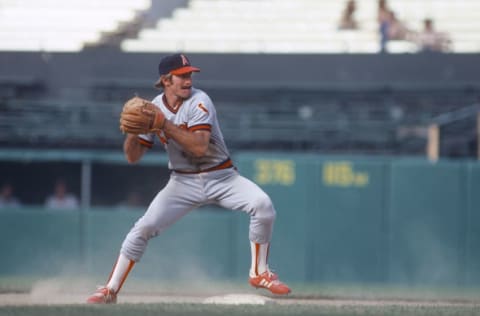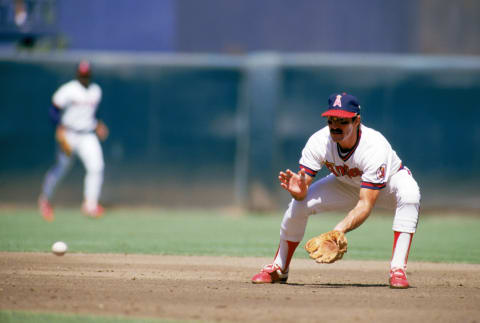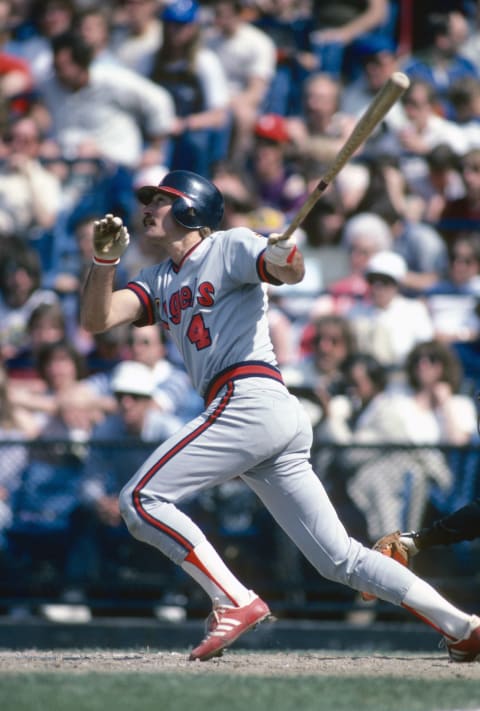Should Bobby Grich be in the Hall-of-Fame?


Bobby Grich fell off the Baseball Hall-of-Fame ballot in 1992, but there’s an argument that he should have been enshrined in Cooperstown.
For Angels fans, this is a familiar argument. Bobby Grich, the second baseman that formed the heart and soul of the Angels throughout the late seventies and into the mid-eighties, should be a Hall-of-Famer.
His name was removed from the ballot in 1992 when he only received 2.6 percent of votes, but that doesn’t mean his Hall-of-Fame credentials should be forgotten.
Grich, who played high school baseball at Woodrow Wilson High School in Long Beach, was drafted by the Orioles, where he played the first seven seasons of his career. It was in Baltimore where he proved to be one of the most reliable defensive infielders in the game. He won four Gold Gloves before signing with the Angels as a free agent in 1976.
Over the next ten seasons, the 6-foot-2 second baseman would hit .269/.370/.436 for the Halos with 157 home runs and 557 RBIs, while fielding his position at an elite level. At first glance, it wouldn’t appear as if Grich’s numbers justify a Hall-of-Fame argument, but when you look closer they might.
The interesting thing about making a case for Grich to reach Cooperstown is that you need to rely on his accomplishments from Baltimore to make a strong argument. While Angels fans would have loved to see him enter the Hall wearing a Halos cap, without his performance in Baltimore, there’s no argument to make.
Playing for the Orioles, Grich won all four of his Gold Glove Awards, appeared in three All-Star games, and in 1973, had his best overall season as measured by Wins Above Replacement (WAR).
Should Bobby Grich be in the Hall-of-Fame?

The case against Grich
Let’s start with the reasons why Bobby Grich failed to reach the necessary 5 percent vote to remain on the Hall-of-Fame ballot in 1992, let alone eventually reach the point he could have been enshrined.
It starts with accomplishments. Hall-of-Fame voters like to honor players who have led the league in a variety of categories and won lots of awards. While Grich won four Gold Glove Awards, there have been players who have won many more. The same could be said of his six All-Star appearances, an impressive number, but nothing that jumps off the page. He was a Silver Slugger winner only once.
In terms of leading the league in statistical categories, Grich hit the most home runs in the strike-shortened 1981 season (22). He also led the league in slugging percentage (.543) and OPS+ (165) that season. But besides that, he never led the league in anything else throughout his entire career.
While the advanced metrics put Grich near the top of the league over several seasons, MVP voting failed to weigh his unique defensive value in relation to his batting numbers. He finished in the top ten of MVP voting twice, but never higher than eighth. Other than in 1981, he never had a singular season that set him apart from the rest of the league. He reached 100 RBIs only once, batted .300 over a qualified season only once, and hit 30 home runs only once.
Grich’s career numbers fail to add up to anything special. He hit .266/.371/.424 over 17 seasons, with 224 home runs and 864 RBIs. Respectable numbers, but not Hall-of-Fame numbers.

The case for Grich
Angels fans don’t need to be reminded that if things had turned out differently at the end of Game 5 of the 1986 American League Championship, Grich’s two-run home run to give the Halos a 3-2 lead in the sixth might have helped end his career with a World Series championship.
But long before that home run, Grich built an impressive resume for the Hall-of-Fame if you look at metrics beyond the traditional counting statistics.
Hall-of-Fame expert Jay Jaffe created the Jaffe WAR Score System (JAWS) to evaluate Cooperstown worthiness using a variety of factors that compare players who have already been elected into the Hall with potential candidates. As defined on Baseball-Reference, a player’s JAWS is his career WAR averaged with his 7-year peak WAR (not necessarily consecutive years).
Using JAWS, Grich should have been a sure-thing Hall-of-Famer as a second baseman. In fact, his JAWS value ranks 7th all-time; other than Chase Utley and Lou Whitaker, he is the only player in the top 15 who hasn’t been enshrined in Cooperstown.
Looking at the average Hall-of-Fame values for second baseman, Grich’s career WAR of 71.0 is higher than the baseline of 69.5 WAR, and his 7-year peak WAR of 46.4 is also better than the 44.4 baseline, which averages the peak WAR totals for 20 Hall-of-Fame second basemen.
It’s Grich’s defensive value that is most difficult to translate into traditional Hall-of-Fame thresholds, which is reflected better in advanced metrics like Wins Above Replacement. However, if you look at leaderboards that are easier to discuss at your local bar, Grich shines there, too. You just need to look.
From 1973-1975, the Michigan native led the league in double plays turned as a second baseman. He has turned the 12th most double plays in second base history. He also has the 17th most putouts, 19th most assists, and his range factor, which measures putouts plus assists divided by innings played, ranks third all-time.
As baseball enthusiasts have learned the value of considering metrics beyond just home runs and RBIs, the argument for Grich becomes louder. He has the 8th highest career WAR total of second baseman in baseball history.
Think about that. Grich’s overall value as a player, according to WAR, ranks next to Hall-of-Famers Rod Carew and Craig Biggio, and Grich couldn’t even stay on the ballot.
Next. Plan would put Angels and Dodgers in same division
It’s unfortunate the Angels legend lost his chance to be enshrined in Cooperstown. Perhaps, down the road, voting will improve to consider the value of defense, and use advanced metrics that highlight the true value of a player like Grich. For now, Angels and Orioles fans are left remembering his greatness on message boards and articles like this one.